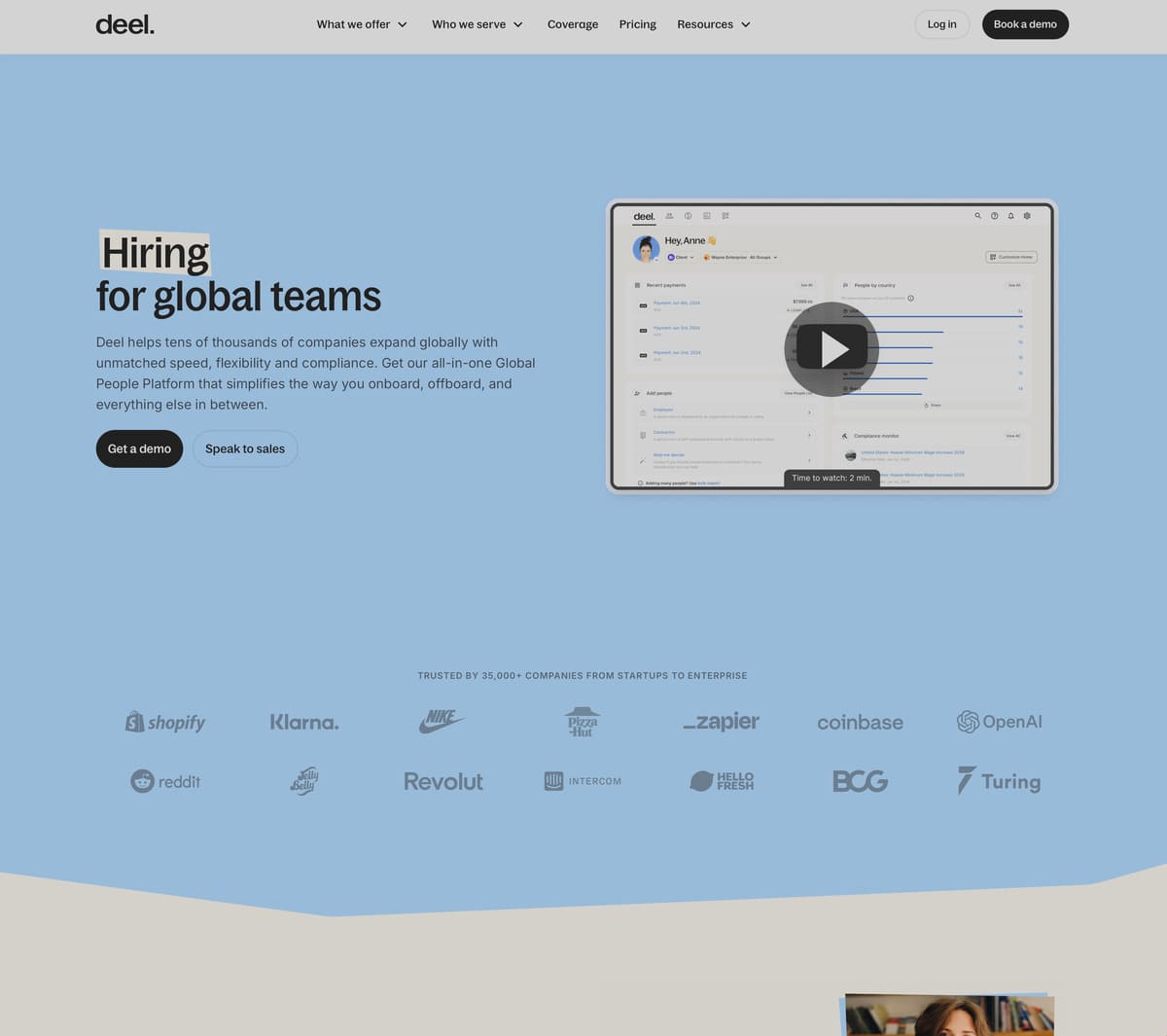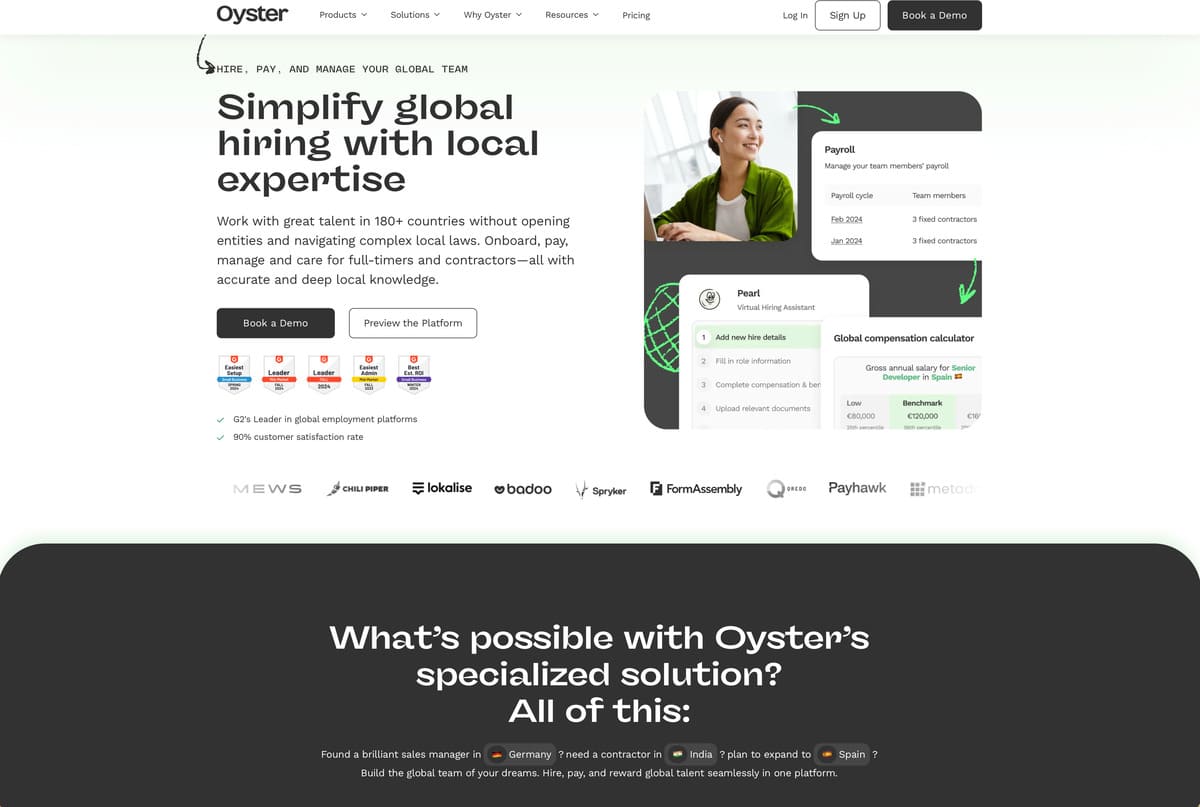Both Deel and Oyster are prominent global workforce management platforms that assist businesses with hiring, onboarding, and managing remote employees across multiple countries. Both platforms simplify compliance, payroll, and benefits administration, but they have unique features that cater to different business needs. Below is a detailed comparison of Deel vs Oyster for their services and costs.
Deel vs Oyster comparison
| Feature | Deel | Oyster |
|---|---|---|
| Hiring Models | Employer of Record (EOR), contractor management, payroll for entities. | Employer of Record (EOR), contractor management, hybrid team solutions. |
| Supported Countries | 150+ countries. | 180+ countries. |
| Compliance Management | Automated contracts, local labour law compliance, and tax filings. | End-to-end compliance support, focusing on local regulations. |
| Payroll Solutions | International payroll for EOR employees, contractors, and local teams. | Payroll for EOR employees and contractors with integrated invoicing. |
| Benefits Administration | Global benefits packages, equity grants, pension schemes, and insurance. | Health insurance, pensions, and localised benefits for employees. |
| Onboarding and Offboarding | Digital onboarding tools with automated workflows. | Seamless onboarding and offboarding aligned with global standards. |
| Integrations | Slack, QuickBooks, Xero, BambooHR, and others. | Greenhouse, BambooHR, and QuickBooks. |
| Support Model | 24/7 multilingual support. | Global support with dedicated onboarding specialists. |


Pricing comparison
Deel pricing
- Contractor Management: Starts at $49 per contractor/month.
- EOR Services: From $599 per employee/month.
- Custom Plans: Available for large-scale enterprises with additional compliance and payroll needs.
- Additional Costs: Optional add-ons for equity management, visa sponsorship, and advanced reporting.
Oyster pricing
- Contractor Management: Free for up to 2 contractors, then $29 per contractor/month.
- EOR Services: From $499 per employee/month.
- Scale Plans: Custom pricing for enterprises managing large, distributed teams.
- Additional Costs: Fees for premium benefits packages, legal consultations, and bespoke HR support.
Strengths and weaknesses
Deel
Strengths:
- Superior integration ecosystem supports seamless workflow automation.
- Comprehensive global equity management solutions.
- Advanced reporting features for HR and finance teams.
Weaknesses:
- Higher pricing tiers for small businesses.
- Some users report a steep learning curve for advanced features.
Oyster
Strengths:
- Lower EOR pricing for small businesses and startups.
- Transparent pricing structure with minimal hidden fees.
- Strong focus on ethical employment and localised benefits.
Weaknesses:
- Limited integrations compared to Deel.
- Contractor management tools are less robust for larger enterprises.
Suitability by business size
| Business Size | Deel | Oyster |
|---|---|---|
| Small Businesses | Suitable but can be expensive; better for businesses scaling rapidly. | Highly suitable due to affordable pricing for EOR and contractors. |
| Medium Businesses | Excellent for mid-sized firms managing complex global payroll and equity. | Great for firms focused on cost-effectiveness and ethical employment practices. |
| Large Enterprises | Ideal for multinational firms needing advanced compliance, reporting, and integrations. | Customised enterprise solutions suitable for high-volume hiring across diverse markets. |
Key differentiators
Deel USPs
- Advanced financial and tax compliance tools, making it a leader in regulated industries.
- Equity and stock option administration sets it apart for tech-heavy businesses.
Oyster USPs
- Ethical employment focus with initiatives like “Distributed Talent Enablement”.
- Transparent pricing with free contractor management for small teams.
Verdict – Deel vs Oyster
Deel is best suited for businesses prioritising scalability, financial compliance, and equity management. It is an excellent choice for tech firms and large enterprises with complex needs.
Oyster, on the other hand, appeals to smaller businesses and startups seeking cost-effective global hiring solutions with strong localised support. Its ethical employment practices and transparent pricing make it an attractive option for socially conscious organisations.
When choosing between the two, businesses should consider the size of their workforce, budget, and long-term global expansion goals.
FAQ – Deel vs Oyster
Deel uses automated systems to ensure tax compliance for contractors and employees, including features like tax filings and withholding for supported countries. Oyster, while offering comprehensive compliance services, focuses heavily on providing guidance for local regulations and ethical employment practices.
Both Deel and Oyster offer benefits packages, but Deel provides more options for equity management and pension schemes, while Oyster emphasises localised health insurance and ethical benefits tailored to employee needs.
Yes, both platforms provide Employer of Record (EOR) services, allowing businesses to hire employees in countries where they lack a legal presence. Deel is particularly strong in compliance and scalability, while Oyster offers more budget-friendly options for smaller teams.
Deel offers visa sponsorship as an optional service for businesses managing global talent, while Oyster does not directly provide visa sponsorship but offers resources to navigate international hiring complexities.
Deel supports a wider range of integrations, including tools like Slack, Xero, and BambooHR. Oyster has a more limited set of integrations but focuses on seamless connections with HR systems like Greenhouse and QuickBooks.
Deel provides a highly automated onboarding process with digital workflows designed for speed and compliance. Oyster’s onboarding process is more tailored, focusing on creating an inclusive experience for remote and hybrid teams.
Deel may include additional costs for premium features like advanced reporting and equity management, depending on the plan. Oyster’s transparent pricing structure minimises hidden fees, making it more predictable for scaling operations.
While both platforms prioritise compliance, Oyster places a strong emphasis on ethical employment by advocating for fair pay and localised benefits. Deel focuses more on compliance and financial tools to ensure businesses meet regulatory standards.
Both platforms support contractor management, but Deel’s tools are more robust for handling payment processing and tax compliance. Oyster, however, offers a free tier for managing a small number of contractors, making it a cost-effective choice for startups.
Deel offers 24/7 multilingual support to assist businesses operating across multiple time zones. Oyster provides global customer support with dedicated onboarding specialists to guide businesses through the hiring process.



